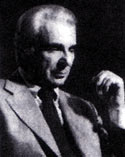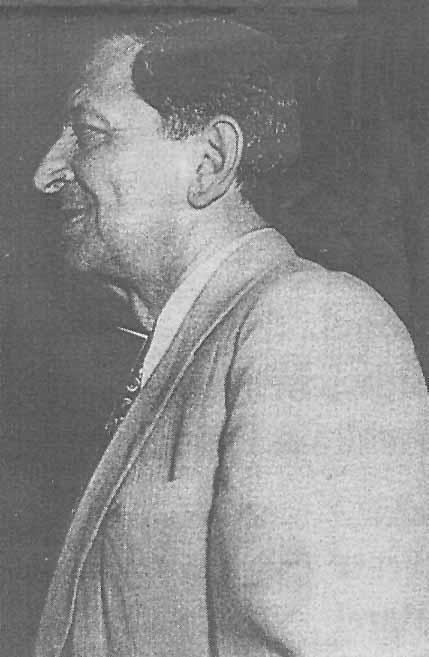 |
|
|
|
|
 by Christopher Xenopoulos Janus |
Nick the Greek: Poker Icon |
|
Today more people play poker than any other game in the world. Casinos in Las Vegas, Atlantic City, Los Angeles and other cities offer $1,000,000 tournaments and precious prizes to the winners. Poker has become one of our cultural phenomena and its popularity is growing.
Historians don't agree on when poker originated, but for most writers poker derived from a Persian game called as-nias. From Persia it went into Greece and it was played at the Plaka just beneath the Acropolis. Eventually it was brought into our country by Columbus's sailors. It was particularly popular in New Orleans. Poker was assimilated into American culture so fast and so thoroughly that some historians maintain that the game is almost as old as Western civilization itself. I once played poker with King Farouk and Somerset Maugham on the Riviera. |
 Nick the Greek - Nick Dandolos |
|
His answer was very friendly but blunt, it went something like this: "Janus, you obviously enjoy the game and you play with enthusiasm. That should be the limit of your poker goals: just to enjoy it. You don't have the makeup of a winning poker player. 'In the first place you have too honest a face to bluff. And bluffing is essential to being a winner. In the, second place, you don't have the memory to play serious poker. Third, can you afford it? You can't be a master poker player unless you come to the game with a big bank roll to meet any bluff, any bet." I never did take Nick the Greek's advice and I've been playing poker 50 years. I don't think I'm an overall winner and Nick was right but I do enjoy the game. I now come to Nick the Greek's famous come back story which is still told in poker clubs all over the world. At this point Nick the Greek - (or a young punk as some called him) - with perhaps more determination than skill but that is not how Nick thought of himself. He remembers only that the group he was going to play with this night had really humiliated him and he lost more than $25,000 of his family's money. He was determined to show this group he was a different person. There were seven players. The game was 7 -card stud; The game began slowly playing in the leisurely manner of men starting to eat a grand meal and determined to linger over each course. Nick played tensely trying to subdue the flutter of his anxiety. Just as quickly as he had been losing, he began to win. They took a short break and when they resumed playing nick was about $40,000 ahead. There was a flair of excitement for Nick in the 7-card stud game. Nick saw a third ten fall up to match the pair of tens he held in the hole. One of the players had an ace showing and from the first card the betting was strong. Nick once again fought the temptation to raise the bet unable to stifle the nagging uncertainty that the player with the aces had filled out 4 aces. Nevertheless Nick saw the $10,000 bet. At then next time around the player with the aces bet another $10,000. Nick stared at his cards giving the impression he was gravely evaluating the wager. Nodded slowly and counted out the amount. "I call the $10,000," Nick said. The response was "Aces bet $20,000." You are a madman, the player with the aces hissed. Time for a reckoning now. When I finish with you, a bum will spit as you pass; And, Punk, I call your raise." He did not wait for Nick to show his hand fumbled with his fingers and flipped over his hidden cards. "A full house! Aces and jacks full." A tornado of vengeance and power swept through Nick. He turned over his hidden cards - 4 tens! Then he turned to his opponent and said: "You've insulted me for the last time. Now let's see how much of a gambler you really are. You want to gamble some more. All right. Let's cut the cards once for my two hundred and ten thousand. And I'll take your marker for that amount now." For a frantic moment stiffened by vanity and rage, the aces player seemed to accept the challenge. Then a panic he could not subdue plundered him. He slumped like a corpse in his chair and cried. |
|
(Posting date 24 April 2006) Educated at Harvard and Oxford, Christopher Xenopoulos Janus started his writing career as a reporter for the Chicago Daily News. Later he became a special writer for The New York Times Sunday News Magazine section where the late Lester Markel was his editor. During World War II, Janus joined the Department of State serving in Washington, Cairo and Athens on Greek War Relief and Rehabilitation programs. This experience had a great influence on his writing. After World War II, the author was involved in various entrepreneurial experiences. At one time he owned Adolph Hitler's Mercedes Benz and toured it through the United States. He was an Investment Banker, but always took the time to be involved in the world around him. Since his retirement from business, the author has devoted his time to writing, publishing and traveling. He founded and published the widely acclaimed Greek Heritage, The American Quarterly of Greek Culture, and with William Brashler wrote Search for Peking Man (Macmillan 1975). Janus' novel Miss Fourth of July, Goodbye has been filmed by Disney Productions. Around the World in 90 Years reflects much of the author's own warm and caring philosophy of life embodying unconditional loyalties and boundless enthusiasm. They feature a strong sense of self-reliance and the courage and wisdom to be interested in everything. Yet, as his mentor, George Santayana once cautioned the author: "Don't be awed by anything." Most recently, the prestigious American Hellenic Institute Foundation of Washington, D.C. awarded its Hellenic Heritage Lifetime Achievement Award to Christopher Xenopoulos Janus.
Mr. Janus is the author of numerous articles appearing on HCS. Readers are invited to view: "The Girl With Melancholy Eyes," "Our First and Only Christmas in Sistersville" |
|
 |
|
|
2000 © Hellenic Communication Service, L.L.C. All Rights Reserved. http://www.HellenicComServe.com |
|